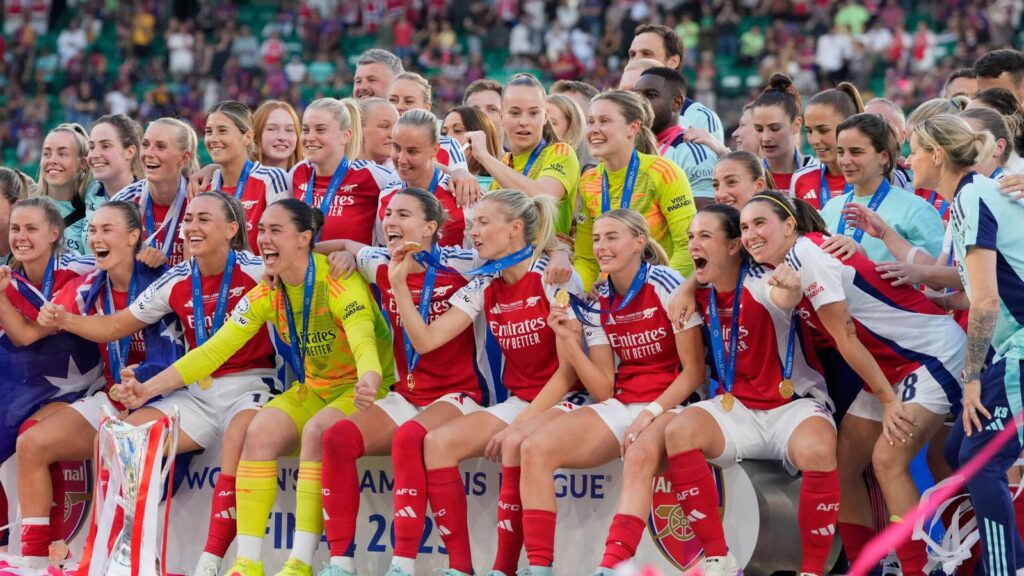It was meant to be Chelsea. It was meant to be Sonia Bompastor, the European specialist, and the only individual to have conquered the Champions League as a player and a coach three times.
But Chelsea could not do what Arsenal have. They could not beat Barcelona.
Renee Slegers led her team up to the winner’s podium at the Estadio Jose Alvalade, with realisation only just setting in, as unassuming as ever in club shorts and t-shirt, boots on, as if she were leading a regular training session.
Moments later she waded through the glitter and red and white streamers after Kim Little and Leah Williamson jointly hoisted the Champions League trophy aloft, its glare reflecting the scorching heat of the Lisbon sun, and was embraced by her family.
The triumph was Arsenal’s, but the architect was Slegers.
“We changed the game plan in the week and it paid off,” Williamson, who was a colossus at the back, making 14 clearances and two goal-saving blocks, revealed to TNT Sports. “We knew we had to have the game of our lives.”
The last time Arsenal won this competition against Sweden’s Umea in 2007, Williamson was also there, but as a ball girl while playing in the club’s world-renowned academy system as a 10-year-old. 18 years later she is writing her own history.
The enormity of the achievement felt akin to a mic drop moment in many ways. Arsenal have undergone a remarkable transformation this season but very few outside the club – pundits and fans alike – believed it was possible to beat bewitching Barcelona, winners in three of the past four campaigns, on the biggest stage.
This is a team whose midfield contains Aitana Bonmati and Alexia Putellas, recipients of the last four Ballon d’Or awards between them. A team that had scored at least once in each of their last 41 games. A team that had netted 19 goals in the three games leading up to Saturday’s final.
A team that put eight past domestic treble-winning Chelsea in the semi-finals. Eight. Golden-age stuff.
“We were born for these types of matches,” peerless Bonmati said in her pre-match interview. The midfielder, widely considered the most technically gifted of any currently in the women’s game, took six shots, three of which needed saving by Daphne van Domselaar. She created just as many chances. Her 80 touches were double what Little (41) managed in Arsenal’s midfield. But none of that mattered in the end.
Arsenal were able to suppress and restrict Barcelona in a way very few teams can. They scored by one substitute teeing up another. They played in moments, were clever and more streetwise, underpinned by a belief that has propelled them from the very first qualifying round to champions.
No team has ever lifted the European trophy having had to navigate 15 games, nor had to overturn first-leg deficits in three separate ties. Dethroning Europe’s leading force in the final was fitting, a microcosm of the struggle endured just to get there.
If they were dwarfed by the magnitude of the occasion or might of their opponent, they did not show it. The north Londoners have been resurgent ever since Slegers took charge ahead of matchday two of this competition, charging through some teams and fighting back against others. Defeats to Bayern Munich (under Jonas Eidevall), Real Madrid and Lyon along the way all seem distant, and yet the adversity of those losses feels strangely relevant.
Setbacks have come to define Arsenal this season. They battled from 2-0 down against Real at the quarter-final stage and, even more stunningly, from 2-1 down against eight-time champs Lyon in the last four.
In the three WSL games preceding the final, the Gunners shipped a total of 13 goals, thrashed by both Aston Villa and Brighton.
But present behind the scenes has been a reassuring calmness. A figure of composure and consistency and honesty. Slegers’ structure and process has had genuine healing powers on this group, and prompted a seismic shift from underachievers to history makers.
A team fragmented under predecessor Eidevall – often criticised for his emotional decision-making towards the end – is now unified. Content with playing different ways and different styles because it’s all part of a carefully constructed tactical plan.
“We know how good we are,” Slegers reflected afterwards, still wearing the same humble smile. “We knew momentum would shift, maybe other people were thinking something else, but that’s what we believed.
“In all the phases, the mentality and resilience, our belief was incredible.”
Perhaps the team’s resolve is best summed up by captain Little, only two years Slegers’ junior, and the only survivor from their first European title: “It always felt like our year.”
To have triumphed against such unfavourable odds arguably makes this Arsenal’s greatest moment. Their fearlessness has been richly rewarded. Slegers, a former academy player herself, has delivered the silverware they have so long craved, and in doing so reimagined Arsenal’s place in sporting history.
The most decorated women’s side in English football can finally call themselves European champions once again.






